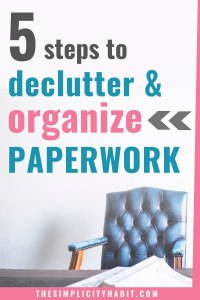Essential Paperwork Needed When You Leave Your Job

When you decide to leave your job, there's a plethora of tasks and considerations to take into account, from tying up loose ends to ensuring your future stability. One of the critical components of this process is dealing with the essential paperwork. Not only does this documentation ensure you've covered all your bases, but it also sets a foundation for a seamless transition into your next career move. Let's delve into the essential paperwork you'll need to manage as you exit your current employment.
Exit Interview and Termination Documents

Your journey starts with the exit interview, a session that might feel formal or informal depending on your workplace culture. Here, you'll discuss reasons for leaving, provide feedback, and sometimes answer a set of questions designed to improve the organization's employee retention strategies.
- Exit Interview Form: This form captures your feedback on your employment experience. It's vital to be honest but constructive in your responses.
- Termination Notice or Letter: Whether you're resigning or being let go, you'll need to submit or receive a formal notice in writing. This document establishes your official last day at work.
- Non-compete Agreement: If applicable, review any non-compete clauses that might restrict your future employment or business ventures.
💡 Note: Keep copies of all forms and agreements. You might need them for reference in the future or to resolve any disputes.
Human Resources and Benefits Documentation

The paperwork doesn't stop at the exit interview. HR will ensure you're processed out of the company's systems. Here are the key documents to keep in mind:
| Document | Description |
|---|---|
| Benefits Termination | Understand when your health insurance, dental, and other benefits end, and what your options are post-employment. |
| COBRA or equivalent notices | In the U.S., this gives you the option to continue health benefits at your expense for a limited period. |
| 401(k) or Pension Distribution Forms | Decide whether to roll over, cash out, or leave your retirement funds with the former employer. |
| Severance Agreement | If offered, understand the terms, what you're waiving by signing, and when the payments will be made. |
| Final Paycheck Details | Review when and how you'll receive your last paycheck, including any unused vacation or sick time pay-out. |

Returning Company Property

Before you walk out the door, make sure you've returned all company-owned items:
- Company laptop, tablets, or any electronic devices
- Access badges or keys
- Any documents or files
📌 Note: Ensure you get a receipt or some form of acknowledgment that you've returned all company property to avoid any disputes later.
Reference and Recommendation

Requesting references or recommendations should not be an afterthought:
- Reference Letters: Ask trusted colleagues or managers for these. They can be handy in future job applications.
- LinkedIn Recommendations: It's digital networking era - leverage LinkedIn for endorsements and references.
Unfinished Work and Transition

Communicating your unfinished tasks or projects ensures a smooth transition:
- Handover Document: Detail your ongoing projects, their status, contacts, and important notes.
- Project Transfer Form: This might be a formal document outlining the transfer of responsibilities.
Leaving a job doesn't just involve resigning; it's about completing a cycle in your career with professionalism. Managing paperwork effectively not only protects your interests but also ensures your departure is graceful. You've built relationships, developed skills, and now it's time to move forward with the tools and documentation necessary to continue your career journey on the right foot.
Final Steps

Before you exit the building for the last time, confirm the following:
- You've collected all necessary documents related to your separation from the company.
- All personal belongings are with you; nothing is left behind.
- Personal accounts are not linked to the company's IT infrastructure.
- You've provided contact details for future networking or references.
🔍 Note: Keep an organized file or digital folder with all the paperwork. It will be invaluable for future reference or in case of any post-employment queries.
Handling the paperwork when leaving your job may seem daunting, but it's a crucial step in ensuring that your transition is seamless and your future opportunities are not hindered. With the right documents in hand, you'll not only protect your interests but also open doors to new professional adventures. Remember, each piece of paper you manage could pave the way for your next successful chapter in the career landscape.
What if I’m not given an exit interview?

+
While some companies do not conduct exit interviews, you can still provide feedback via email or another written form. It might be helpful for future reference.
Can I negotiate a severance package?

+
Yes, severance packages can often be negotiated, especially if you have a valid case like long-term employment or exceptional circumstances surrounding your departure.
How long do I have to decide on continuing my health benefits with COBRA?

+
You typically have 60 days from the date you receive your COBRA notice or the date your coverage ends to elect to continue coverage.



